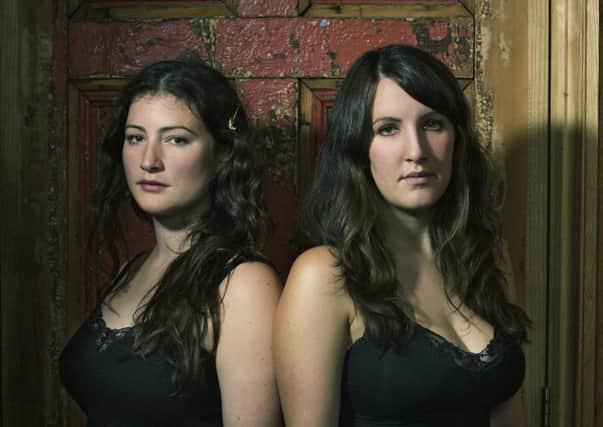Album reviews: The Unthanks | Avril Lavigne | John Mayall


The Unthanks: Lines (Rabble Rouser) ****
Avril Lavigne: Head Above Water (BMG) **
John Mayall: Nobody Told Me (Forty Below Records) ***
Running festivals and singing weekends, collaborating with colliery brass bands and visual artists, paying tribute to other artists… Northumbria’s The Unthanks are partial to a themed project and have a wide-ranging fanbase to show for their adventurous creativity.
Their latest box set, Lines, brings together three separate projects, all inspired by poetry, and is one of their most suitable and beautiful ventures to date, playing to their strengths in storytelling, atmosphere and bittersweet sentiment.
Advertisement
Hide AdAdvertisement
Hide AdPart One: Lillian Bilocca is their recording of the music from The Last Testament of Lillian Bilocca, actress Maxine Peake’s site specific theatre piece about the eponymous activist’s campaign for improved safety at sea following Hull’s triple trawler disaster of 1968.
A Whistling Woman features Becky Unthank in more urgent, rhythmic mode than usual, singing Peake’s lyrics over surging piano. In contrast, sister Rachel sings as Bilocca on the softer, more contemplative contours of The Sea is a Woman while the glistening tones of Adrian McNally’s Fender Rhodes adorn a haunting and unexpected cover of Lucky Luke theme I’m a Poor Lonesome Cowboy.
Part 2: World War One adapts the words of First World War poets, including a couple of lesser sung female voices. Teresa Hooley’s War Film, inspired by First World War footage, is particularly potent in its stark simplicity, while Rachel and Becky harmonise wistfully on Jessie Pope’s intimate Socks.
These are complemented by two entirely new compositions – the gentle uplift of Everyone Sang by Tim Dalling and the mellow lyricism of Sam Lee’s Roland and Vera, adapted from letters sent between the writer Vera Brittain and her fiancé, the poet and soldier Roland Leighton, who was killed in the conflict.
Part 3: Emily Brontë sets ten poems by the Wuthering Heights author to music composed by McNally on Bronte’s own piano in the Haworth Parsonage museum after visitors left for the day. The restored piano has to be played gently, all the better to convey the tender delicacy of her verse.
There is a graceful, courtly movement to the piano melody of She Dried Her Tears and They Did Smile, ancient folk vibrations to the subtle harmonies of The Night Is Darkening Round Me, a sonorous sweetness to Lines and a spring-like levity to I’m Happiest When Most Away.
These sensitive renderings are currently available to hear as a sound installation in the Parsonage or, for those who can’t make it to Yorkshire, as part of this lovingly packaged triple set of self-styled “medium players”.
Such subtlety is not in the musical vocabulary of Canadian pop princess Avril Lavigne who was virtually bedridden for two years with Lyme disease. But worry not, she’s back and she wants to sing you all about what she has described as “the battle of my lifetime” using the perennial drowning metaphor on the title track of Head Above Water. Goddess occupies that banal no man’s land between contemporary country and R&B while the sassier swing of Tell Me It’s Over and snotty cheerleader baying of Dumb Blonde make a welcome change of tone from the overwrought pop chest-beating.
Advertisement
Hide AdAdvertisement
Hide AdBritish blues veteran John Mayall celebrates his 85th birthday by assembling an array of guitar-slinging guests, including Todd Rundgren and Rush’s Alex Lifeson, plus latterday blues guitar heroes Joe Bonamassa and Larry McCray, for some pretty slick standard fare on Nobody Told Me.
Conan O’Brien’s house horn section get the rhythm’n’blues party started on That’s What Love Will Make You Do and Steve Van Zandt guests on the stealthy prowl of It’s So Tough but they are all outgunned by his new touring guitarist Carolyn Wonderland, cooking up a storm against Mayall’s fluent organ licks on blues rocker Distant Lonesome Train. - Fiona Shepherd
CLASSICAL
Lutoslawski/Penderecki: Complete works for violin and piano (Delphian) ****
It’s the old story: when life is hard, creativity takes on a biting edge. Against the volatile political temperature of Poland post-Second World War, composers reacted with music energised by the world they lived in, chief among them Lutoslawski and Penderecki, whose complete music for violin and piano is featured in this debut disc for Delphian by Scots violinist Michael Foyle and Estonian pianist Maksim Stšura. They open with the emotive contrast of Lutoslawski’s feverish Subito against the contemplative calm of Recitativo e arioso. The playing is gutsy, alive and alert, these short pieces brilliant scene setters
for Penderecki’s fiery Sonata No 1. After the same composer’s aphoristic Three Miniatures and Lutoslawski’s Bartók-influenced Partita, Penderecki’s Sonata No 2 (composed in 2000), the most recent of all the works represented, is a gripping apotheosis, its anguished final movement disappearing high into the musical stratosphere. - Ken Walton
JAZZ
Chris Potter: Circuits (Edition Records) ****
Don’t be lulled by the mellow, multi-tracked reeds chorale which opens Chris Potter’s first album on Edition. As the subsequent Hold It demonstrates energetically, the esteemed US saxophonist is, in his own words, “back into grooveland,” in the company of drummer
Eric Harland, keyboardist James Francies and electric bassist Linley Marthe.
Eastern-sounding tenor sax and cavernous looping open The Nerve, which progresses into quite a workout, for Francies as well as Potter; Koutomé, on the other hand, spins a lithe, west-African groove with pattering drums and glittering keyboard work.
Advertisement
Hide AdAdvertisement
Hide AdPurposeful bass and drums emerge from a trippy soundscape into the substantial title track, which sees no-nonsense expounding from tenor sax and nervy synth excursions over Harland’s snappy tempo changes and further multi-tracked horns, while Pressed for Time heralds appropriately urgent tenor sax blowing and skittering keyboards over hectic drumming. - Jim Gilchrist